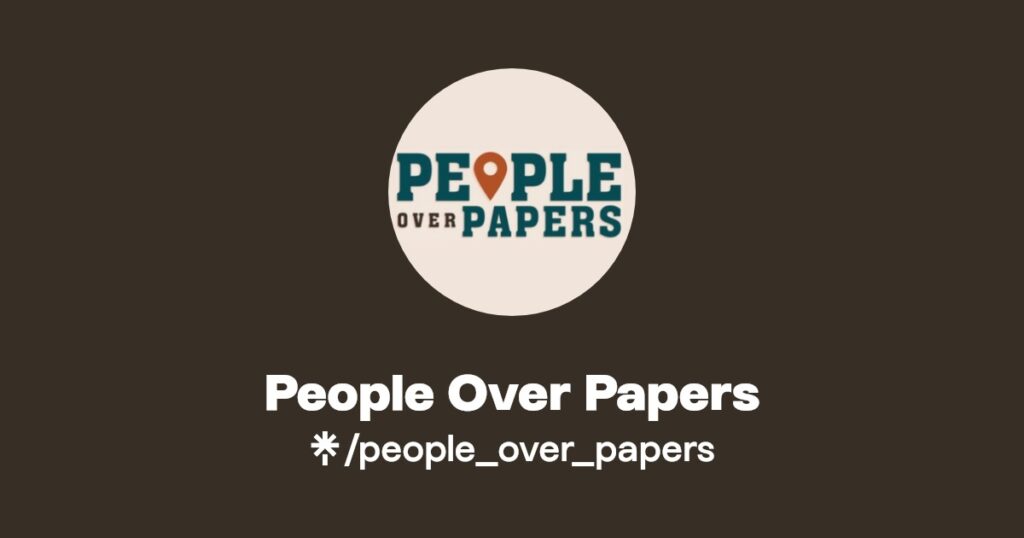The phrase “People Over Papers” is more than a modern slogan—it’s a new way of thinking. It means valuing humans, their skills, and their ideas more than forms, rules, and official documents.
In simple words, it’s about focusing on the person behind the paperwork. For too long, organizations, schools, and governments have cared more about what’s on paper—degrees, certificates, or reports—than the real potential of people.
But times are changing. The modern world now rewards creativity, emotional intelligence, and teamwork more than just paperwork. This shift is shaping the future of work, education, and leadership.
The Old Way: When Papers Meant Everything
In the past, success was judged by paper qualifications. You needed the right degree, the right certificate, and the right resume to get ahead.
This paper-based system often ignored people with great ideas but no formal proof. It created barriers for talented individuals who learned from experience, not just classrooms.
Paperwork also slowed down progress. Every task required forms, signatures, and endless documentation. The process became more important than the purpose. That’s where the “People Over Papers” mindset comes in—to bring the focus back to people.
Why the World Is Changing
The digital era has changed how we think, work, and connect. Automation, artificial intelligence, and remote work have replaced piles of paper with smart, online systems.
Today, a skilled programmer or designer might not have a college degree but still create something world-changing. A creative marketer can go viral with a single idea, not a certificate.
The world now values performance, not paperwork. Companies and governments are learning that real results come from people, not piles of documents.
The “People Over Papers” Movement in Workplaces
Rethinking Hiring
Many companies used to filter candidates by degrees or job titles. Now, they care about skills, passion, and adaptability. Tech giants like Google, Tesla, and Apple have dropped the “degree required” rule for many roles.
This change means anyone with talent and creativity can succeed—no matter what’s written on paper. It’s not about who you are on a document but what you can actually do.
Valuing Soft Skills
Communication, teamwork, and emotional intelligence are now more important than formal credentials. A person who listens, learns fast, and works well with others adds more value than someone with a perfect resume but no people skills.
People Over Papers in Human Resources
Human Resource departments are evolving too. Traditional HR was all about documentation—employee files, appraisals, and policies.
Now, HR focuses on building relationships and supporting people’s growth. Modern companies use data to help employees improve, not to control them.
Performance reviews are becoming conversations, not checklists. Feedback happens in real time, not once a year. The result? A workplace where people feel seen, heard, and motivated.
Education: Skills Over Certificates
The “People Over Papers” idea is transforming education worldwide. For years, success was measured by grades and diplomas. But now, employers and educators see that skills matter more.
Online courses, digital bootcamps, and practical projects are helping students prove what they can do instead of just showing what they’ve studied.
For example, a self-taught coder can get hired by showing real projects, not just a degree. This shift makes learning more equal and accessible for everyone.
Technology Makes It Possible
Ironically, technology is helping us focus more on people. Paperwork that once took hours can now be done in minutes online.
Digital records, automation, and cloud systems mean less paper and more time for human connection.
For example, hospitals use electronic health records to treat patients faster. Companies use digital signatures to close deals instantly. Governments provide online services that once required standing in long lines.
This isn’t just about speed—it’s about freeing humans from repetitive paperwork so they can do meaningful work.
Real-World Examples of “People Over Papers”
1. Google
Google hires many employees without traditional degrees. They focus on problem-solving ability and innovation.
2. IBM
IBM’s “New Collar Jobs” program focuses on skills, not degrees. They hire self-learners who can prove their abilities.
3. Zappos
Zappos values company culture and happiness. They believe motivated people create better results than strict corporate systems.
4. Patagonia
This brand supports employee well-being by offering flexible schedules and childcare, showing that people matter more than paperwork.
These companies prove that prioritizing humans creates better productivity, creativity, and loyalty.
Government and Bureaucracy Are Adapting Too
Governments are also realizing the power of people-first systems. Many countries are going paperless to improve efficiency.
Digital ID cards, online applications, and e-signatures make public services faster and more transparent. When citizens don’t have to chase documents, they can focus on living and working better.
It’s not just about convenience—it’s about respect. A system that trusts people saves everyone’s time and energy.
The Emotional Side: Humans Need Recognition
Beyond systems and technology, “People Over Papers” touches something deeply emotional. Everyone wants to feel valued—not as a number or file, but as a human being.
Employees who feel recognized perform better. Students who are trusted learn more. Customers who are heard stay loyal longer.
Respect, empathy, and connection are powerful motivators. Papers can record facts, but people create impact.
Challenges in Adopting “People Over Papers”
While this idea is inspiring, it’s not always easy to apply. Some organizations still rely heavily on paperwork to maintain order or prove accountability.
Legal and financial sectors, for example, require documentation for compliance. But even there, digital tools are helping reduce the load.
The challenge is balance. We can’t eliminate all papers—but we can make sure they serve people, not control them.
The Future of “People Over Papers”
The future will belong to empathetic, people-centered organizations. As automation takes over repetitive tasks, human qualities like creativity, emotion, and problem-solving will matter most.
Workplaces will become communities built on trust and collaboration. Education will focus on learning by doing. Governments will aim for simplicity and transparency.
The “People Over Papers” movement isn’t just a trend—it’s the foundation of the future human era.

Why This Mindset Builds Stronger Businesses
When organizations put people first, everything improves. Productivity rises, innovation increases, and employee retention strengthens.
People who feel valued bring their best ideas forward. They take ownership, think creatively, and support others. This builds long-term growth far beyond what paperwork alone can achieve.
In the end, businesses that invest in people build something papers never can: trust.
People Over Papers in Daily Life
This philosophy isn’t just for companies—it’s for everyone.
When parents listen to their children more than focusing on grades, they build confidence. When teachers see students beyond report cards, learning becomes joyful. When friends or leaders care more about feelings than forms, relationships grow stronger.
The message is universal: humanity should always come before bureaucracy.
Conclusion:
The “People Over Papers” philosophy reminds us that success isn’t printed—it’s lived. Papers record achievements, but people make them happen.
As the world becomes more digital, this message becomes even more powerful. We need empathy, creativity, and connection more than ever.
A system that values humans first will always outlast one that values documents. The organizations, schools, and governments that understand this will shape the most successful and humane future.
In the end, the truth is simple: papers may tell your story, but people create your legacy.
FAQs
1. What is meant by “People Over Papers”?
It means prioritizing people’s skills, creativity, and emotions over documents, rules, or formalities.
2. Why is this idea important today?
Because the modern world runs on innovation and empathy, not just paperwork and policies.
3. How does it affect workplaces?
Companies hire and reward people based on skills, teamwork, and real results—not degrees or titles.
4. Does this mean paperwork is bad?
No, paperwork has its place, but it should support people, not limit them.
5. What’s the future of this movement?
A global shift toward people-first systems where human value defines success.
Read Also : 300 Grams to Cups: Simple and Accurate Kitchen Conversion Guide

